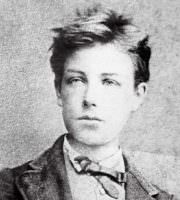by Arthur Rimbaud
I
Oh! the huge avenues of the holy land, the terraces of the temple! What has happened to the brahmin who taught me the Proverbs? From then and from there I can still see even the old women! I remember silvery hours and sun near rivers, the hand of the country on my shoulder, and our caresses as we stood in the fiery fields. —A flight of red pigeons thunders around my thoughts—In exile here I had a stage on which to perform the dramatic masterpieces of all literatures. I might tell you about unheard-of wealth. I follow the story of the treasures you found. I see the next chapter! My wisdom is as neglected as chaos is. What is my void, compared with the stupefaction awaiting you?
II
I am a far more deserving inventor than all those who went before me; a musician, in fact, who found something resembling the key of love. At present, a noble from a meager countryside with a dark sky I try to feel emotion over the memory of mendicant childhood, over my apprenticeship when I arrived wearing wooden shoes, polemics, five or six widowings, and a few wild escapades when my strong head kept me from rising to the same pitch as my comrades. I don’t miss what I once possessed of divine happiness: the calm of this despondent countryside gives a new vigor to my terrible scepticism. But since this scepticism can no longer be put into effect, and since I am now given over to a new worry—I expect to become a very wicked fool.
III
In an attic where at the age of twelve I was locked up, I knew the world and illustrated the human comedy. In a wine cellar I learned history. At some night celebration, in a northern city, I met all the wives of former painters. In an old back street in Paris I was taught the classical sciences. In a magnificent palace, surrounded by all the Orient, I finished my long work and spent my celebrated retirement. I have invigorated my blood. I am released from my duty. I must not even think of that any longer. I am really from beyond the tomb, and without work.
Last updated February 06, 2012




